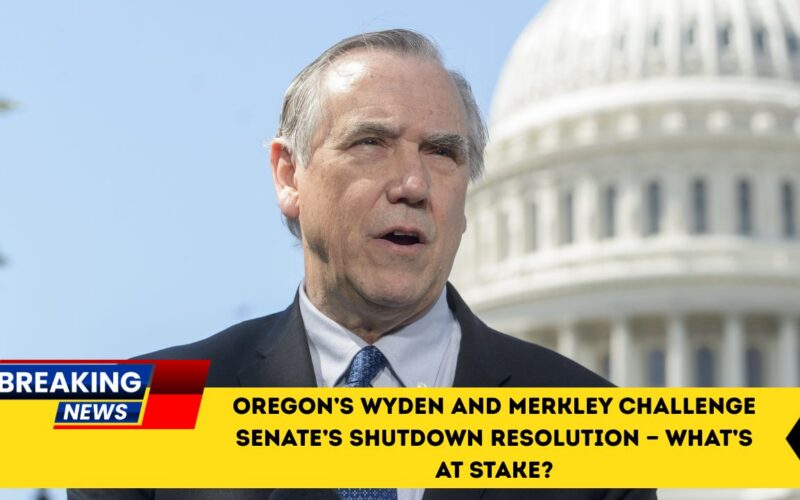Two of Oregon’s most prominent U.S. senators, Ron Wyden and Jeff Merkley, have taken a firm stand against the recent Senate resolution aimed at ending the federal government shutdown.
Their opposition highlights deeper concerns about health care, fiscal responsibility, and legislative accountability.
This article examines what the resolution proposes, why Wyden and Merkley oppose it, and what consequences may follow for the government, Oregon, and the American public.
What Does the Shutdown Resolution Propose?
At the heart of the matter is a Senate-passed resolution intended to fund portions of the federal government and block a full shutdown. Key details include:
- The resolution aims to resume federal operations by adopting a continuing resolution (CR) rather than a full appropriations bill.
- Voting results: Senate passed the resolution by a narrow margin—54 votes to 46—illustrating the divide.
- The resolution does not extend enhanced health-care tax credits, a top priority for many Democrats.
- Many agencies remain under funding uncertainty, and the measure doesn’t cover all of FY2026.
Key Details of the Resolution
| Feature | Details | Impact |
|---|---|---|
| Funding scope | Partial govt funding via CR | Leaves gaps in full fiscal year coverage |
| Health-care tax credits | Not extended | Could increase premiums for millions |
| Vote outcome (Senate) | 54-46 approval | Shows significant bipartisan resistance |
| Duration | Short-term until full appropriations passed | Raises risk of another shutdown |
| Sponsor/Proponent | Senate GOP leadership | Lacked key Democratic support |
Why Wyden & Merkley Oppose the Resolution
Senator Wyden described the resolution as “incomplete and dangerous,” citing concerns over health-care access, fiscal stability, and legislative transparency.
Similarly, Senator Merkley called the vote “a brutal blow” to those “who have stood together to save affordable healthcare for more than 20 million Americans.” Their specific objections include:
- The measure fails to protect enhanced premium tax credits for the Affordable Care Act, which benefit low- and moderate-income Americans.
- They argue it leaves workers, seniors and families vulnerable by delaying full budget passage and critical funding.
- They claim it weakens the Senate’s role in full fiscal oversight by relying on stopgap funding rather than comprehensive bills.
What’s at Stake for Oregon and the U.S.
For Oregon residents, the stakes are higher than usual given both senators’ vocal positions and the state’s economy. Key areas impacted:
- Health-care affordability: Without extension of tax credits, Oregon’s Medicaid‐expansion and insurance programs could face higher costs.
- Federal workforce & services: A prolonged resolution brings uncertainty for federal employees in Oregon and for services like the Oregon National Guard support.
- State budgeting & funding: Oregon’s own budget may feel strain if federal funding is delayed or disrupted.
- Legislative precedent: Wyden and Merkley’s stand underscores growing concern about the Senate relying on short-term funding rather than full appropriations, which can undermine long-term planning.
Potential Outcomes & Next Steps
- Congress must pass full appropriations bills or another CR by the end of the fiscal cliff date—currently projected in late November.
- If the resolution fails or is extended repeatedly, the risk of another partial or full shutdown looms, affecting agencies, contractors, and federal benefits.
- Oregon’s senators may push amendments to restore health‐care credits, or seek bipartisan support for a new funding package.
- Watch for future floor speeches, filibusters or procedural blocks—Merkley has already conducted a 22-hour Senate speech earlier this year in protest of the shutdown strategy.
The opposition by Senators Wyden and Merkley to the Senate’s latest shutdown resolution highlights the broader tension between stopping a government shutdown and ensuring that funding deals are fair, inclusive, and address major issues such as health-care affordability.
For Oregon and the nation, the resolution’s shortcomings pose real threats: to families, federal workers, and the long‐term integrity of the legislative process.
As the drama unfolds, vigilant observation of next steps in Congress will be critical—because the decisions made now could affect millions of Americans and shape how budgets are handled for years to come.




